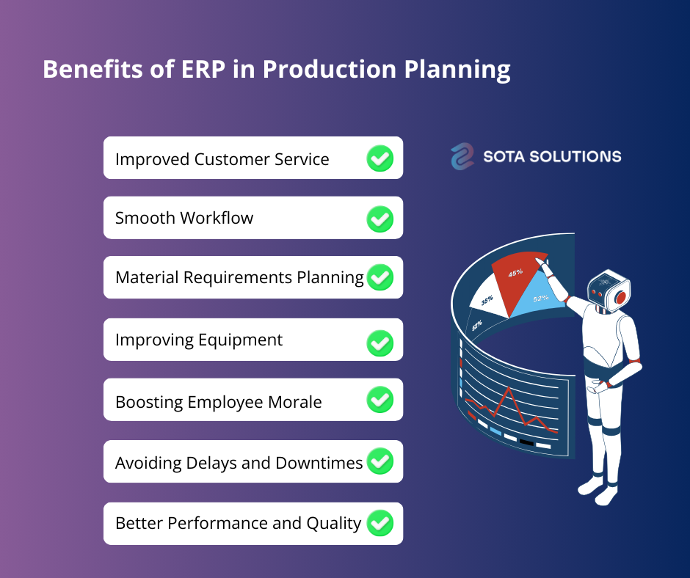Effective business operation often hinges on meeting customer demands promptly and economically. Integral to this success is the practice of production planning, which orchestrates the entire manufacturing process. From predicting market requirements to allocating essential resources such as materials, labor, and machinery, production planning ensures streamlined operations. By crafting realistic production schedules and swiftly adapting to unexpected challenges, it optimizes efficiency and supports sustained business growth.
What is a Production Plan?
Production Planning is a series of implementation processes that require meticulousness and accuracy to produce a comprehensive plan for a certain period of time. It spells out the production targets, required resources, processes and overall schedule. The goal is to design the most efficient way to make and deliver the company’s products at the desired level of quality.
How Does the ERP Software Increase Productivity?
We have seen that an ERP solution is made up of several modules that help in streamlining and managing various business activities and departments, which eventually help in production planning.
In other words, the technology used in business management software allows you to automate internal tasks and keep track of all activities in each area of the business. By automating processes, you can concentrate on more value-added activities, thus enhancing the company's performance and economic benefits.
Centralizing all information in one place allows every department to access it through the software. This setup ensures continuous information exchange and real-time collaboration, significantly aiding decision-making.
Moreover, sharing information company-wide is valuable for understanding performance within each sector. An ERP system helps generate sales reports, assess company profitability, and monitor goal achievement.
Benefits of ERP in Production Planning
You have already observed how enterprise resource planning (ERP) software influences production planning.
Now, let's delve into the specific benefits it offers:

Benefits of ERP in Production Planning
1. Improve Customer Service
The production planning module in ERP simplifies the entire process of acquiring raw materials and transforming them into finished products. Additionally, implementing ERP software helps in scheduling and optimizing the production cycle, ensuring timely delivery of high-quality final products. And delivering products on time plays a vital role in satisfying customers and maintaining long-term relationships.
2. Smooth Workflow
A seamless workflow is essential for maintaining efficiency in any business, and it's especially critical for manufacturers.
Disruptions in workflow can lead to increased workloads, delayed deliveries, and lost customers.
Automating tasks ensures that repetitive, time-consuming, and tedious processes are removed, manual intervention is minimized, errors are reduced, and the workflow remains smooth and consistent.
ERP systems for manufacturing aid in the planning, execution, and control of production while integrating these operations with other business systems.
3. Inventory Control and Management or Material Requirements Planning
For any business, inventory control is important – but for a manufacturing business, it is a critical process.
Managing and controlling inventory efficiently and in a structured way is essential. It helps management to maintain a balance between carrying sufficient inventory to be able to meet customer demand, without overstocking and running the risk of high cost and risk of inventory holding.
Inventory Management module of SotaERP continuously updates the status of inventory in real-time, placing orders automatically or sending alerts to the relevant personnel to ensure timely replenishment so that production is not affected.
It includes functionality that ensures that the stock is replenished exactly when required so that the company need not hold vast quantities of items that are working in progress.
In short, ERP production planning helps to make sure that the inventory is processed and managed in a streamlined manner.
4. Improving Equipment
Regular maintenance and equipment cleaning is vital to ensure its smooth functioning and avoid any unexpected breakdowns. However, in reality, servicing is often put off or delayed, which causes damages or sudden breakdown of machines, resulting in lost productivity.
ERP in production planning helps schedule regular maintenance and ensures timely cleaning. It prevents breakdowns and significant repairs while keeping machinery in better shape to meet target outputs.
5. Boosting Employee Morale
A disorganized workflow can heighten employee stress levels, potentially leading to significant accidents during production. Conversely, implementing a structured and seamless workflow can mitigate these risks.
Stress-induced mental and physical fatigue can result in subpar products on the production line. Implementing efficient ERP software can alleviate stress and boost employee morale. Moreover, such a system fosters enhanced collaboration, enabling cross-departmental teams to meet deadlines in a coordinated and efficient fashion.
6. Avoiding Delays and Downtimes
In manufacturing, idle time occurs when workers or machinery are unproductive, leading to costs without corresponding returns. This can result from various issues like raw material shortages or machine repairs. However, manufacturing ERP software can prevent this by scheduling inventory replenishment and maintenance, ensuring continuous production and timely deliveries.
7. Enhanced Performance and Quality
Ensuring quality control is paramount in manufacturing to guarantee flawless final products, ensuring that only top-notch items reach customers. Throughout the manufacturing process, adherence to industry standards is vital for product acceptance, guaranteeing the excellence of the end products. This is indispensable for a thriving business. By prioritizing product quality, you can count on customers to organically promote your brand, becoming loyal advocates without any prompting.
Conclusion
ERP has become a must-have for all manufacturing enterprises worldwide in this technologically advanced era. This system is a highly effective way to streamline the production planning process, thus boosting performance, productivity, and revenue. Therefore, get an effective, customizable, and flexible ERP software for production planning to witness significant growth in your manufacturing unit’s overall productivity.
